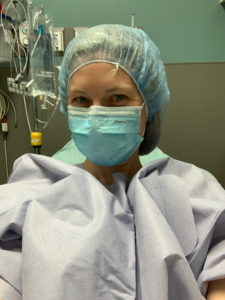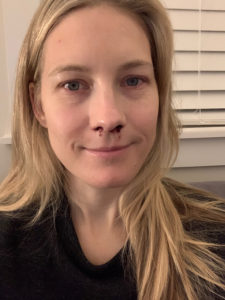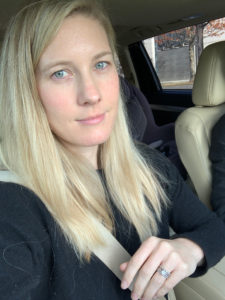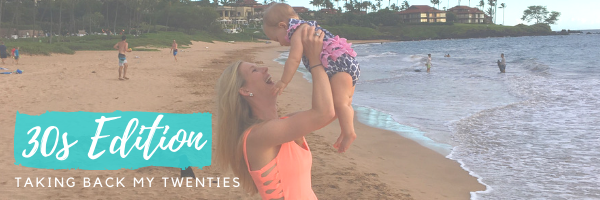I got a couple of requests to write a post about my surgery – it seems many people are struggling with grinding their teeth (hello pandemic stress) or are debating surgery.
I’ve been grinding, well clenching my teeth for a couple of years now. I have the specialty mouth guard from my dentist and it helps in general, but the clenching got much worse in recent years. I mentioned the concern to my dentist and she referred me to a specialist (known as a myofunctional therapist). Myofunctional therapists can assess if there are problems with how your mouth and the muscles around it are functioning and then provide physical therapy to help with any issues. The therapist who did my assessment said there is usually a physical reason why people grind. She checked my airways, assessed my tonsils, and looked at my bite, tongue position, and palette. She noticed that when she put a finger over my right nostril, I was straining to breathe; she recommended I see an ENT to check for a deviated septum. She explained that I should be breathing through my nose at night (a topic that is in the spotlight right now), and that mouth breathing is commonly associated with teeth clenching.
I saw the ENT and he confirmed that I had a deviated septum – my left nostril was 80-90% blocked and he thought surgery could make a big difference. He had me try a month of a nasal steroid (Flonase) and an antihistamine to see if that improved anything, and then left the surgery up to me. I started to notice how hard it was to breath through my nose (I have NEVER understood how people do this in yoga), especially when exercising. I also haven’t felt rested after sleeping for a while now (I blamed it on having Avery). After a month with no improvement with medication, I decided to schedule the surgery. For anyone who is local, this is who did the surgery.

It’s about a 90 minute procedure that requires general anesthesia. The surgeon makes a small incision inside one side of the nostril and repositions the cartilage of the septum. The surgeon also ‘reduced the turbinates’ on the insides of my nostrils to make a little more space for air flow. I’ve never been under general before, so I was nervous about that but the actual prep and surgery were a piece of cake – they gave me some kind of relaxing med in my IV as they wheeled me back and I was out.
I think waking up was one of the worst parts – my throat ached from the oxygen tube, my nose throbbed, I was dying of thirst from not being allowed to drink, and I just wanted to keep sleeping. I was home about 2 hours after I woke up and much more comfortable after a narcotic, food, and water. I still look pretty rough.

I wouldn’t say much of the recovery was painful, but it was super uncomfortable. I took narcotics for the first full day, and then switched to Tylenol and Ibuprofen. Even when the pain medication wore off, it was more of a dull pain and not a huge deal. I also had a nausea patch behind my ear which lasted about 2-3 days, so I didn’t feel as great after the third day. The part I wasn’t expecting was how my body responded to the surgery. I was exhausted, didn’t have much of an appetite, and was so congested I could barely breathe. I also had silicone nasal splints in my nostrils and blood dripping from the incision side for days. The blood would dry inside my nose, so that, combined with the nasal splints and congestion, were pretty miserable. And I couldn’t blow my nose. Imagine the worst cold of your life. PS: I highly recommend the kids boogie wipes for recovery.
Most people have the splints removed on day 7 after surgery. Because I didn’t want to have to bring Avery to that appointment, I asked if there was any way I could do it a bit early when my mom was still in town. So, I had them removed 5 days after surgery and I am SOOO thankful I didn’t need to go another second with them in my nose. I was super nervous for the appointment (and took anti-anxiety meds before) because I was so afraid it would hurt my just-operated-on nose (and I was warned it was not fun)! The doctor sprayed some lidocaine in my nostrils; it was only painful for a second when he was clipping the stitches. The actual removal of the splints (and then some large worm-like blood clots) wasn’t too bad and I felt WORLDS better having everything out of my nose!

Overall, I’d say it was a full 7-10 days until I felt normal again (and 2 weeks of no exercise). Now, one month later, I still have some congestion, a little swelling, and it’s still sensitive. I can breathe through my nose!! I wouldn’t say it’s life-changing just yet, but it’s so much better. I’m definitely waking up feeling more rested. I also haven’t used my mouth guard since surgery and haven’t had a teeth clenching headache or sinus pressure since the surgery!!
Let me know if you have any other questions!

Elana
January 21, 2022 at 9:24 amHi Laura! Thank you for sharing your experience. Did you have any difficulty with insurance covering the surgery?
Laura
January 21, 2022 at 11:00 amI didn’t have any problems getting it covered since it was formally diagnosed and the ENT recommended the surgery for medical reasons. That said, it was still a couple thousand after insurance, so not an easy decision to make. At least I hit my deductible so my kids 1 million doctors visits for Covid tests are now covered 🙂
K~
January 22, 2022 at 10:07 amGood morning
I had surgery in 1983 for a deviated septum that really was a rhinoplasty
Years ago, ENTs said every one had a ds to get a free nose job.
Yes true story.
Glad you are feeling better, you look great
Laura
July 15, 2022 at 4:08 pmOh interesting – I was offered one but he said it was an additional procedure, made the recovery more painful, and would not be covered by insurance…
Taylor
January 24, 2022 at 9:20 amThis is fascinating! Thank you for sharing.
My husband is a mouth breather and I believe has had major jaw issues as a result of never being able to breathe through his mouth since he was a young kids. It’s totally affected his face development and he can’t usually sit still or he starts dozing. It was my intention to have him go to a breathing institute this year to potentially have surgery. I was just on my way to the library today to pick up that Breathe book by James Nestor to convince him to think about surgery. Anyway, thanks again for detailing your recovery and I hope
You’re pain-free soon!